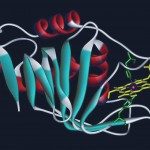Link to Pubmed [PMID] – 7543780
Cytokine 1995 Apr;7(3):277-86
It has been reported that rapamycin (rap), cyclosporin A (CsA) and FK506 have immunosuppressive effect during the activation process of murine T cells. These drugs were investigated for their suppressive effect on a murine T cell line expressing intermediate (TS1 beta) or high (TS1 alpha beta) affinity IL-2R. Rap and CsA strongly inhibit the IL-2-dependent proliferation of TS1 alpha beta cells while they minimally affect the IL-2-mediated proliferation of TS1 beta cells. FK506 does not have any effect on the IL-2-driven proliferation of either TS1 beta or TS1 alpha beta cells. Simultaneous addition of Rap and CsA or Rap and FK506 inhibit the IL-2-mediated proliferation of TS1 beta and TS1 alpha beta cells and therefore FK506 does not revert the inhibition mediated by Rap in TS1 alpha beta cells. Neither Rap nor CsA affect IL-2R expression and internalization in TS1 alpha beta cells. CsA and Rap strongly inhibit the appearance of DNA binding activity of NF-AT and to a lesser extent NF-kappa B. Rap inhibits IL-2-stimulated phosphatidylinositol 3 (PI3) kinase activity in TS1 alpha beta cells. In TS1 beta cells, Rap activates PI3 kinase on its own, inhibiting the IL-2-stimulated PI3 kinase to a lesser extent. These results suggest that PI3 kinase is a target for Rap action. Our results strongly suggest that we have Rap and CsA sensitive and resistant activation pathways operating in TS1 beta and TS1 alpha beta cells.

